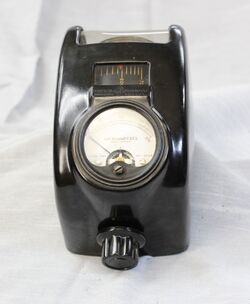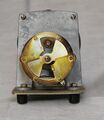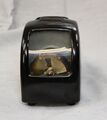1140-A: Difference between revisions
Jump to navigation
Jump to search
No edit summary |
No edit summary |
||
| Line 12: | Line 12: | ||
"Manual Needed" | "Manual Needed" | ||
}} | }} | ||
The '''General Radio 1140-A UHF Wavemeter''' introduced in 1948 Catalog L and remained available through Catalog N 1954. | The '''General Radio 1140-A UHF Wavemeter''' introduced in 1948 Catalog L and remained available through Catalog N 1954. | ||
The 1140-A is a simple device to measure frequency in the UHF range of 240 to 1200 MHz with 2% accuracy. Behind the rear window is what's | |||
called a Butterfly circuit which varies capacitance and inductance simultaneously to atain resonance. Resonance is indicated with a | The 1140-A is a simple device to measure frequency in the UHF range of 240 to 1200 MHz with 2% accuracy. Behind the rear window is what's called a Butterfly circuit which varies capacitance and inductance simultaneously to atain resonance. Resonance is indicated with a micro ammeter. | ||
micro ammeter. | |||
==Specifications== | ==Specifications== | ||
Revision as of 05:45, 7 March 2024
The General Radio 1140-A UHF Wavemeter introduced in 1948 Catalog L and remained available through Catalog N 1954.
The 1140-A is a simple device to measure frequency in the UHF range of 240 to 1200 MHz with 2% accuracy. Behind the rear window is what's called a Butterfly circuit which varies capacitance and inductance simultaneously to atain resonance. Resonance is indicated with a micro ammeter.
Specifications
- Frequency Range: 240-1200 MHz in one range.
- Accuracy: ±2% of the indicated frequency.
- Detector: A type 1N22 Crystal Detector (Microwave Diode).








